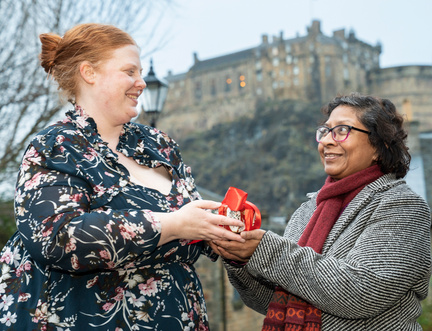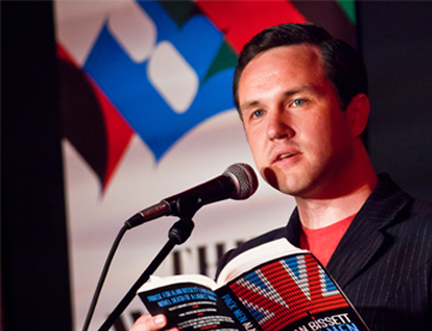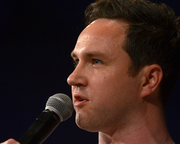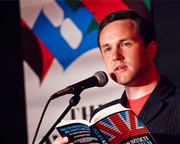Flotsam & Jetsam
By Alan Bissett
We have commissioned a new piece of writing from fifty leading authors on the theme of 'Elsewhere' - read on for Alan Bissett's contribution.
The sails of the dhows waved on the horizon, a lazy flotilla of canvas shark-fins. Kate shielded her eyes to gaze at them, the boats conjuring scenes from the fantasy novels of her youth. She had to remind herself that these were mere fishing boats, not the advance guard of some tentacled warrior species. But here, with the cool surf nosing at her feet and the sky yawning blue, she felt dreamy and liquid, her imagination uncurling from the trap Glasgow had made for it. No bus of xeroxed minds scanning the Metro. No gloomy meetings at which the main word intoned was ‘cuts’, before – like necromancy – they’d come to pass. No clutched coffee-time huddled over the jobs section of the paper. That morning she’d been given a lemon-grass massage by a teenage girl whose ebony fingers had pressed and kneaded out those hard Scottish knots. The girl had complained about her boyfriend’s infidelity. ‘You should leave him,’ Kate had mumbled from the end of a long corridor, through which ambient music flowed like coconut milk.
Kate headed along the beach, tugging a linen shawl over shoulders already pinkened by sun. The sand glowed a Zanzibarian yellow. Waves hissed. Endless, sweet hours of nothing stretched before her. She’d packed big novels that needed time, space and a hammock to absorb – Gravity’s Rainbow, Anna Karenina – but so far she’d lifted only a guide book which made exotic promises on each page: ‘One of Africa’s best known and most enticing destinations.’; ‘Tropical languor’; ‘Miles and miles of white sands lapped by warm, translucent waters’. Just reading it made her the sort of dizzy teenagers feel when first in love.
Further up the beach, a black man in an LA Lakers vest was chatting to a white couple wearing shades and sun hats. The couple were nodding, while the black man smiled, his fingertips pressed earnestly together. A birdsong of laughter flashed across the sand. So the locals were friendly to tourists. Of course they were. Kate reprimanded herself for fearing otherwise, then pitied those back home and their litany of excuses for not coming: Rochelle, who wasn’t prepared to blow the severance pay; Harriet, struggling with her mortgage; Gerda, who’d shocked Kate by worrying openly about kidnappings, rapings, torture – ‘They don’t like white people in Africa, Kate. Haven’t you seen the news?’
The man in the LA Lakers vest was approaching her. Kate had a point to prove to Gerda.
‘How you doing today?’ the man smiled, his limbs easy, his gait relaxed.
‘Wonderful!’ Kate beamed back, ‘What a beautiful country you have.’
‘Thank you. But sometimes we forget. Every day the sun. Every day the sea.’ He mock-rolled his eyes. ‘We need you to remind us.’
‘Happy to do so.’
‘Where you come from? England?’
‘Scotland,’ Kate replied.
‘Scotland is part of England?’
‘Both part of Britain,’ Kate said, ‘But maybe not for long.’ The man’s eyebrows twitched with confusion. She sensed a long, potentially boring treatise on the constitutional make-up of the United Kingdom unroll before them, its tributary strands on Scottish independence and the vital distinction between ‘England’ and ‘Britain’ snaking infinitely away. ‘Anyway,’ Kate said, ‘You don’t want to hear about that.’
She was right. He didn’t.
‘In Zanzibar we want you to relax. Be happy! We have everything you need. We have beach, we have spice, dolphin, seafood—’
‘Yum,’ said Kate.
‘We have tortoise. Very big!’ At this he pretended to plod on all fours, making a thoughtful, pinched face. Kate laughed and he straightened up, then pressed his fingers together the way she’d seen him do when talking to the couple. ‘How long you stay for?’
‘Here in Nungwi for four days,’ she said, ‘then down to Kendwa, over to Tanzania on safari, and finishing off in Stone Town.’
The man nodded slowly as though taking in each point on the itinerary, then said, ‘You want scuba-dive? Snorkel?’
‘Um,’ Kate said, ‘Maybe. I hadn’t thought about—’
He went into his pocket and took out a card. ‘Me and brother, we run boat, take you out to sea. Coral reefs, dolphins. Ocean beauty. You like. Very good price.’
She took the card. A phone number was handwritten on it next to a name she couldn’t make out.
‘You stay here? In this hotel?’ He pointed towards the compound, its sunloungers, swimming pool and massage benches walled off from the beach.
‘Yes,’ she said uncertainly.
‘I look for you. Tomorrow morning. Afternoon? Take you snorkel on boat. Very good price.’
‘I’ll, uh, I’ll have to think about that.’
‘Okay,’ he said, and glanced towards a man and woman ambling down the beach, ‘I look for you.’
Kate put the card in her bag and watched him head towards the couple, hands open. ‘Hey!’ he greeted them, ‘Where you from?’
The husband shook his head and didn’t break his stride, the wife mumbling, ‘Sorry, we don’t want to snorkel.’ The man wasted no further time, his head revolving, spotting another target further up the sand.
‘Unbelievable,’ the husband muttered.
Kate looked along the surf to see another black man –dreadlocks, Manchester United shirt – setting a course towards her with purpose. She changed direction and walked inland, but he bent his path to meet her, grinning and extending a braceleted arm. ‘Hey, beautiful lady. How long you stay?’
Kate blew air and waved her hat across her face, the shadow of the canopy easing her hot skin. She sipped at the mango juice and spread toes into the cool sand. Six separate men had just tried to sell her snorkelling tours on one mile of shore. She’d chatted to the first three, politely taking their cards and saying that she’d let them know. By the fourth she was lying about which hotel she was in. By the fifth she was saying that her flight was later that day. She hadn’t even stopped for the sixth, instead waved him away and headed towards the sanctuary of a beach restaurant. The hawker had muttered something at her back and she’d flushed with guilt but carried on walking.
‘Restaurant’ was perhaps overstating things. It was three fold-down tables with straw canopies, a chalkboard menu, and a bar with two stools. Its major selling point was that when hawkers approached, the owner would growl at them in Kiswahili and they’d troop moodily away. He bowed his head to Kate and she gave him the thumbs up.
‘They are not even from Zanzibar,’ he grunted, ‘They come from Tanzania. Leeches.’
‘Oh,’ she said.
He handed her a menu then left, and as soon as she looked at the menu she realised she was ravenous. Octopus, kingfish, sea bream, rock cod, grey mullet, shark, squid, tuna, sailfish. Herbs, spices, stews, curries. She wanted all of it. When the owner came back to take her order, glancing warily around for hawkers, she asked how fresh the food was.
He snorted. ‘Very fresh. Caught this morning. You not see dhow?’
‘Oh,’ she said, ‘You don’t get the fish from a shop?’
He shook his head, baffled at such a bizarre, foreign concept. ‘Ocean is there. Reach in! Take!’
‘Of course,’ she said and dipped her head, embarrassed, before ordering the kingfish in coconut milk with rice and plantain. The owner smiled, gentlemanly, then retreated with a final stab of his pen on the pad.
Kate was able to enjoy the beach again, undisturbed at last: the silver line of the horizon, the turquoise waters, the drowsy spell of the dhow, the pearly waves. It was only when her eyes caught the hawkers patrolling back and forth, targeting tourists, that grit entered the idyll. They met up every so often, forming strategies, exchanging successes and failures, before detaching and trying again. She wouldn’t let this irritate her. After all, she was the intruder here. She was the one who’d been picked up in an air-conditioned car at the airport and driven through shanty towns, full of houses with straw doors and roofs of corrugated tin, where children carried litres of water down dirt tracks.
Piled gloriously on the back of one of these villages: the Nungwi complex. A five-star network of hotels and leisure facilities, teeming with Westerners, which separated the townspeople from their own beach. The hotel gates had opened to her as though it were preordained from birth, uniformed Zanzibarians bowing as she’d entered. For a second, the regality of it appealed to her and she’d almost given an imperial roll of the hand.
Fuck you, global recession.
The kingfish, when it arrived, was just about the most beautiful thing Kate had ever tasted. Spicy and moist, tender and flavourful, it made the Michelin-starred chefs of Oban – a place which declared itself ‘the seafood capital of Scotland’ – seem like toddlers mixing ketchup with cereal.
‘You like?’ the owner said, as ecstasy spread across her face with each forkful.
‘Oh,’ she said, ‘Gorgeous.’
He smiled. ‘That is good. You come back here any day. I cook for you.’
‘I certainly will,’ she trilled, and there was a moment of hesitation when he stood over Kate’s table awkwardly before she said, ‘Uh, would you like to join me?’
‘Thank you, that is most kind,’ he said, bowing again. ‘My name is Mustapha.’
‘Kate,’ she said, and when they shook hands she blushed slightly beneath his gaze.
Once he’d sat there was a new directness about him, as though he’d been holding back from the moment she’d stepped in. ‘I am always interested in where tourist come from, why they are in Zanzibar. This is how I learn about the world. Tell me.’
‘Well,’ she said, leaning back from the intensity of his gaze, ‘I’m from Scotland.’
‘Scotland!’ he said, clapping hands together, ‘That is in Ireland, yes?’
‘No, it’s part of Britain. But it’s … it might not.’ She sighed. ‘It’s complicated.’
‘You is here alone, Kate?’
She opened her mouth then closed it, scanning his intentions. But his face was earnest, with no obvious flirtation hovering in his eyes.
‘Yes,’ she said, ‘I needed to get away. Things in Britain are very bad, very gloomy. Bad politics. Bad economy.’
‘Is dictator in Britain?’
‘Ha,’ she laughed, ‘Not quite. Almost! Anyway, I’ve just been made redundant.’
He creased his face.
‘Unemployed. I have lost my job.’
‘Ah,’ he said, ‘I am sorry.’
‘Well, I’m not exactly the only one. The British government are cutting the public sector. So I decided to just, y’know, take off somewhere while I still have the money to do it. I might never be able to afford this again.’ He was listening, but she felt an urge to sound less prosaic, more interested in his culture. ‘And I’ve always wanted to visit Zanzibar, because it sounds so exotic and strange, and so …’
‘Is beautiful place,’ he smiled, ‘We are very lucky for you to choose us.’
‘Believe me,’ she said, ‘the pleasure is all mine. But now that I’m here …’
‘Yes?’
‘I feel a bit guilty. As though I’ve floated in like this rich Westerner, even though I’m not. I mean, look at how wonderful this place is, and you have tourists crawling all over it. It doesn’t belong to the people anymore.’
He folded his arms and stared at her, but she couldn’t work out if it was in judgement or sympathy, and she squirmed a little. ‘Then why you come?’
She shrugged. ‘You can’t swim in the sea in Scotland.’
‘Exactly. We need tourist in Zanzibar. You bring money.’ He rubbed his thumb and forefinger together then laid his hand on her wrist in a brief plea.
‘Yes,’ she said, swallowing, ‘but then I see all the poverty in the villages and I just feel—’
The owner raised a finger, his expression falling.
‘Zanzibar has not poverty. Ethiopia, Ghana, Sudan, Malawi, very poor, yes. But not Zanzibar. We have tourist. We are island. We have clean water, lots of seafood, jobs, hotels, spices. Trade.’
My god, thought Kate, he thinks these are decent living standards? She considered imparting her view of the shanty towns, of the crumbling roads, of the chaotic airport where she’d had to pay a bribe to receive her luggage. Not even the lowest-paid people in Europe live like this. But she wondered if he might find it insulting, and held her tongue.
‘Of course,’ she said, ‘Sorry.’
‘Why you come alone, Kate?’
She glanced up sharply to find his head cocked and a curiosity boring its way in. The loneliness must’ve been shining from her.
‘I, uh,’ she found herself saying, babbling, her hands working at a cardboard beer mat, ‘I don’t know where my life is going. Everything feels so uncertain now. So … unsolid. Britain’s becoming a terrible place. All our selfishness and greed has started to eat us.’
He was nodding, leaning forwards on the table.
‘I don’t know when it was that money just took over. But God, Mustapha, things feel so desperate back home. Everyone’s depressed. Everyone’s empty.’ She gestured out to the sea, to the swaying dhows, to the shimmering waves, to its infinite calm. ‘Whereas here …’
Mustapha ruminated upon this. ‘I understand.’
‘I suppose you’ve had greater troubles than ours, yes?’
He raised an eyebrow and took a deep breath. Then he said, ‘In 1964 we have revolution in Zanzibar. Overthrow British and Arab rulers. Very violent. Twelve thousand people killed.’
‘My god.’
He gave a regretful shrug, which suggested more than it stated. ‘Ruler now is son of first President of independent Zanzibar. Elections not free. Police brutal. So much corruption. Did they not stop your car from airport?’
‘Yes,’ said Kate, remembering her driver slowing at a checkpoint and the police peering in. They’d conversed in Kiswahili and the officer had examined her there in the backseat, before waving them on.
‘Is okay for tourist because tourist bring money, but we Zanzibarians have to pay police at checkpoint. Checkpoint there for no other reason. You no pay, they arrest.’
The waves rolled and hissed in the distance. Mustapha was staring at the table, a growl emerging in his voice.
‘After 2000 election we demonstrate. Twenty six protestors killed by police. No one has protested since then.’
He looked up at her, his face still, almost challenging.
‘That’s terrible,’ she said quietly, ‘I had no idea.’
He turned his head and stared out to sea, seeming to disappear somewhere inside himself. ‘But when I was small boy here? Every day we play on beach. Every day we swim in sea. We catch fish. We laugh. We sail on dhow.’
He lapsed into silence. She reached forward and took his hand, squeezing it. He glanced up at her, attempting to smile, before he blew out air and withdrew his hand. Then he reached into his pocket.
‘That remind me of something.’
‘Yes?’
Mustapha unfolded a piece of paper and spread it out on the table: pictures of a dhow set against a vivid orange sunset, of blue and yellow fish, of pink and mauve coral reefs. He tapped at the leaflet with his forefinger and grinned at Kate.
‘My cousin run snorkelling tour. Very good price. You like?’
Copyright © 2012, Alan Bissett. All rights reserved.
Supported through the Scottish Government’s Edinburgh Festivals Expo Fund.
Look, Listen & Read

Citizen Winter Warmer - Join us Online 12 December
Tue 01 December 2020
- 2025 Festival:
- 9-24 August
Latest News
 Communities Programme participants celebrate success of 2024
Communities Programme participants celebrate success of 2024






